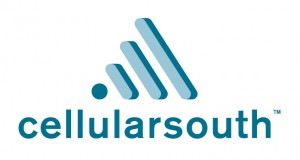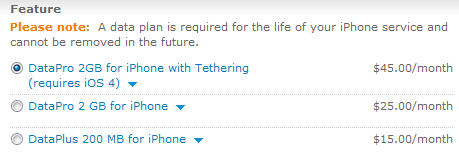 While America’s largest cell phone companies battle over map coverage and work towards limiting wireless data usage, one super-regional wireless carrier is willing to pay customers to dump their old carrier and switch.
While America’s largest cell phone companies battle over map coverage and work towards limiting wireless data usage, one super-regional wireless carrier is willing to pay customers to dump their old carrier and switch.
Privately owned Cellular South, which delivers home coverage over its own network in Memphis, the Florida Panhandle, Rome, Georgia, and parts of Mississippi and Alabama, is offering $100 to hand over your AT&T iPhone and get a brand new Android phone. The company will even cover up to $200 of any early termination fees charged by AT&T or other carriers.
The company offers smartphone plans starting at $50 a month that includes unlimited mobile web access. Customers with two or more smartphones on one account can get “unlimited everything” service for $59.99 per line.

Cellular South, virtually unknown outside of its service areas, has gained wider attention in recent days because of its stand against Verizon Wireless’ LTE network policies and an unrelated total meltdown of a Lauderdale County, Mississippi Board of Supervisors meeting that began with a debate about switching away from AT&T.
[flv width=”640″ height=”447″]http://www.phillipdampier.com/video/Cellular South Ad.flv[/flv]
An ad for Cellular South promotes the fact its smartphone data plan delivers unlimited usage. (1 minute)
The company is planning its own LTE network for its local coverage areas and got into a major dispute with Verizon Wireless, a fellow CDMA carrier, over the LTE standard’s roaming capabilities. Wireless providers who belong to the Rural Cellular Association are disturbed that without interoperability requirements from the FCC, big national carriers will be able to exclude small players from their networks. Even worse, companies like Cellular South may have trouble finding affordable wireless equipment that works on the frequency bands they are allocated to use. What this means for consumers is that equipment purchased for Cellular South’s LTE network may not function while roaming. The carrier told the FCC:
Lack of interoperability in the 700 MHz band will impose significant costs and burdens upon A Block licensees, which will competitively disadvantage smaller and regional carriers and their consumers. By delaying a decision on interoperability, the FCC is denying rural America access to 4G service. Cellular South paid $192 million dollars for licenses in Auction No. 73 and for months has been prepared to immediately put available capital to work to deploy its 700 MHz network in compliance with the FCC’s build-out requirements and for the benefit of its rural and regional consumers. But, without the certainty of interoperability across the 700 MHz spectrum, Cellular South’s capital will remain on the sidelines – unable to create jobs or increase economic activity within its 700 MHz license area.
Collectively, the rural and regional carriers holding Lower A licenses do not have the scale or scope to attract equipment manufactures making Band Class 17 or Band Class 13 equipment to produce Band Class 12 equipment at reasonable costs. Even where Band 12 equipment can be made available, the costs are unnecessarily inflated by the limited scale resulting from the lack of interoperability across the 700 MHz bands. If such equipment were produced, it would not be technically capable of roaming outside of Band Class 12 deployed networks. Nevertheless, rural and regional carriers like Cellular South may have no choice but to reduce the speed and size of their 700 MHz deployment and pay the unnecessarily inflated costs of Band 12 equipment and devices if it wants to compete with Verizon Wireless and AT&T in the 4G market.
 The Rural Cellular Association noted the FCC inquired whether or not rural carriers could simply rely on the good will of Verizon Wireless, which is running its own private interoperability initiative, the Rural American Partnership Program. Verizon says it will work with rural carriers and sign roaming agreements with participants to help ensure equipment was standardized across multiple carriers. But the Rural Cellular Association claims Verizon’s offer was akin to a digital Trojan Horse — a gift to rural operators on the outside, but one that benefits Verizon far more than rural carriers on the inside.
The Rural Cellular Association noted the FCC inquired whether or not rural carriers could simply rely on the good will of Verizon Wireless, which is running its own private interoperability initiative, the Rural American Partnership Program. Verizon says it will work with rural carriers and sign roaming agreements with participants to help ensure equipment was standardized across multiple carriers. But the Rural Cellular Association claims Verizon’s offer was akin to a digital Trojan Horse — a gift to rural operators on the outside, but one that benefits Verizon far more than rural carriers on the inside.
“Verizon’s Plan provides a limited number of rural carriers with nominal opportunity to add or extend their 4G coverage in a way that only fills Verizon’s coverage gaps. Additionally, Lower A licensees paid a significant amount of money for their spectrum, more than Verizon paid for the C block per MHz/pop, and have stringent geographic-based build-out requirements,” Rebecca Murphy Thompson, the rural carriers’ general counsel wrote the Commission. “Considering these strict build-out requirements, Cellular South will focus on building its own business, not helping Verizon expand its network.”
The Rural Cellular Association (RCA) also continued its campaign against what it sees as anti-competitive behavior on the part of AT&T and Verizon.
“In addition to interoperability, RCA described how its members have limited options to obtain nationwide data roaming, but their customers still expect nationwide coverage and comparable services to their urban counterparts. Larger carriers are blocking rural and regional carriers from obtaining data roaming with reasonable terms and conditions because there is no regulatory mandate. RCA plans to supplement the record to provide examples of how AT&T and Verizon have blocked rural and regional carriers from negotiating data roaming agreements with reasonable rates. After a year of negotiations, Cellular South now has a data roaming agreement with one of the larger carriers.”

Lauderdale County, Miss.
For rural America, unaccustomed to getting good cellular coverage, the presence of rural carriers specifically targeting underserved communities as their main business function is a welcome change from “extended service” provided by larger carriers, mostly for travelers, as an afterthought. These smaller carriers also often deliver savings in the communities they serve.
In Lauderdale County, Mississippi, the Board of Supervisors met earlier this week to review potential savings of at least $10,000 a year for the county sheriff’s department, just by ditching AT&T for Cellular South. While Sheriff Billy Sollie had no objections to that, a follow up discussion about what to do with the savings started an on-camera debate that quickly descended into personal attacks and traded accusations.
District 5 supervisor Ray Boswell and Sheriff Sollie turned the meeting into a spectacle with allegations of drug and alcohol abuse, illegal use of county property, culminating in claims the sheriff was a “crybaby” and “a disgrace.” A sheriff’s deputy even joined in at one point, yelling at Boswell for making unsubstantiated allegations and suggesting Boswell was arrested on felony charges but had his record expunged.
While other members of the board, including its president, sat stunned into silence, no one bothered to gavel the shouting match out of order. The resulting 15 minutes of fame has created a sensation, and many area residents are embarrassed and upset.
Cellular South will probably win the county’s business, but heaven help the customer service representative that takes a call from Ray Boswell about a service problem.
[flv]http://www.phillipdampier.com/video/Lauderdale County Meltdown 12-6-10.flv[/flv]
Watch for yourself as a county meeting descends into chaos. As it goes from bad to worse, nobody bothered to intervene to stop the escalating accusations and counter-accusations that have since become an embarrassment for residents of Lauderdale County, Miss. (18 minutes)
 Verizon spokesman Robert A. Varettoni said that it was “an extraordinary time,” adding that there was no credit available otherwise at the time.
Verizon spokesman Robert A. Varettoni said that it was “an extraordinary time,” adding that there was no credit available otherwise at the time.

 Subscribe
Subscribe









